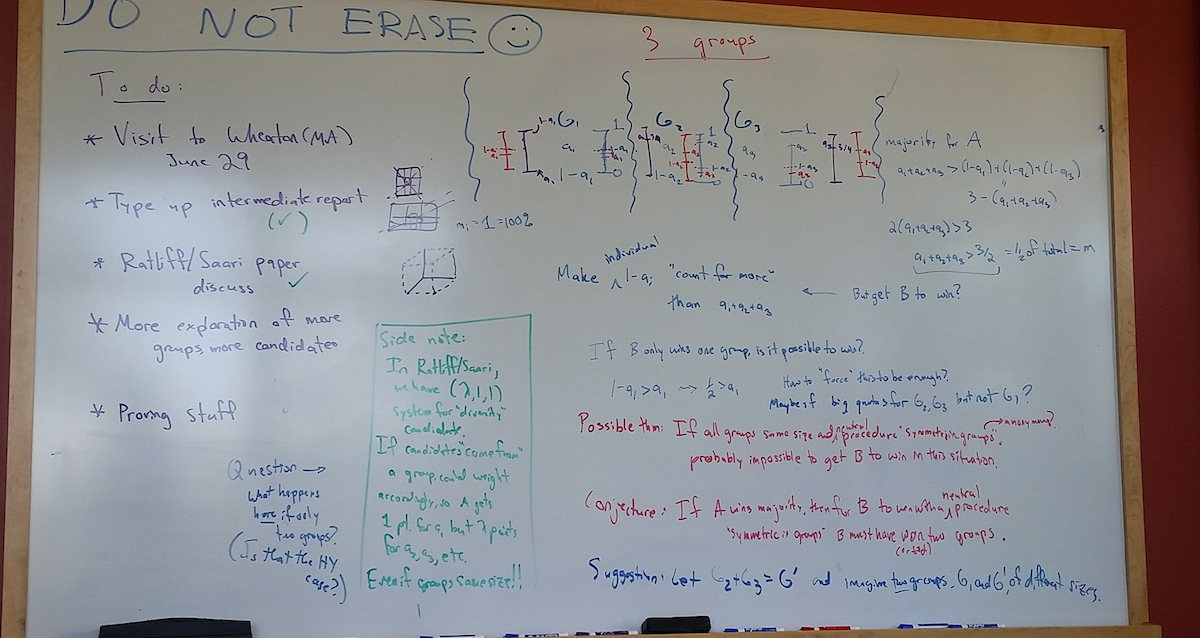Math + Voting Research = Greater Political Understanding
This summer, several student-faculty teams are tackling research projects in the arts and sciences—from asthma to accounting audits, bilingualism and women in leadership. Some are funded through the Provost’s Summer Research Fellowships, and others are individual projects. Throughout the next few weeks, we’ll cover the teams’ progress as they seek to answer complex questions in their fields.
You might not expect a college math professor and students to be conducting research closely related to the 2016 presidential election, but that’s exactly what Dr. Karl-Dieter Crisman, Min-Sun “Sunny” Kim ’17, and Luke Cui ’18 are doing this summer. Kim is a math major; Cui is a double math-physics major.
In their research project, “The Mathematics of Broad Support in Voting,” Dr. Crisman explains, “We’re thinking about how to model voting situations where you might want several subgroups of a populace to have their say, rather than just having the most votes win.”
“The recent Brexit referendum is a great example of this, with Scotland now threatening to secede from the UK because even though more UK voters wanted out, Scotland did not by a sizable margin,” he continues.
“But it could be as mundane as how to award a scholarship” in a way that fairly represents different academic departments. “We have learned that we should expect the unexpected!”
Luke is interested in the project because it ties the logic and theory of the STEM field with contemporary issues. “I’m always wondering how to apply math into social science fields,” he says. “I believe math is everywhere.”
As an international student from China, Luke is eager to learn about the math behind the 2016 election, which the project could illuminate. For example, the challenge of selecting a winner favored by more than one subgroup is “quite closely parallel to the Republican nomination protocol this year,” says Dr. Crisman.
In the project, real-life examples are supplemented by theoretical models. “This involves coming up with our own idea of a plausible voting system and exploring what can happen with that voting system,” Sunny explains. “Different systems might fit better in different situations, so there’s no ‘perfect’ voting system.”
The research process has helped Sunny and Luke gain valuable job skills. “I need to be not only knowledgeable enough but also creative in using math,” Sunny says. She’s also learned some key computer programming skills.
Because he plans to enter a Ph.D. program after graduating from Gordon, Luke says that his undergraduate research experience is very necessary. He’s excited to explore a new way of learning.
In a typical research day, “there is a lot of ‘alone’ time, which is necessary when you bang your head against a problem,” says Dr. Crisman, but the students also collaborate to write up results or plan presentations. In early June, they presented at a conference held by the Mathematical Association of America. “That was a great experience,” says Luke.
Read about Dr. Angie Cornwell (biology) and Courtney Olbrich ’19 >>
Read about Dr. Jonathan Gerber (psychology) and Hannah Reimel ’17 >>
Read about Dr. Kaye Cook (psychology), Taylor-Marie Funchion ’18 and Si-Hua Chang ’16 >>
Read about Dr. Melinda Eichhorn (education) and Courtney Vitale ’18 >>
By Morgan Clayton ’19, history
 The Bell
The Bell